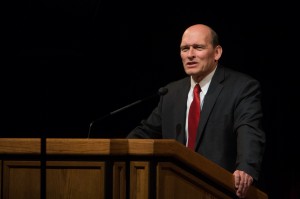
Alexander L. Baugh, a professor from BYU’s Church History Department, spoke about Joseph Smith’s mission as a seer, translator, revelator and prophet at the BYU Devotional on June 24.
Baugh’s grandfather, Francis H. Baugh Jr., instilled an appreciation for the Prophet Joseph Smith in his grandson at an early age through teaching him to play hymns on the piano. His grandfather saved the longest hymn in the hymnal, “The Seer, Joseph, The Seer,” for last.
“Looking back, I think that I can say that it was while I was learning to play that number, along with hearing my Grandfather Baugh sing the words, that I felt the first feelings of a testimony in my heart concerning the life and mission of Joseph Smith,” Baugh said.
Baugh continued his address by expounding on Joseph Smith’s mission through the scope of four roles.
As a seer
Baugh set out years ago to explore the types and number of visions Smith had throughout his lifetime. He categorizes the visions by three different types: visitations by heavenly beings, “mind visions” and visions through divine instruments.
“I was rather surprised when I discovered that documentation exists to show that he had over seventy visions,” Baugh said. “Certainly his most magnificent and doctrinally significant theophany occurred in the Sacred Grove in the spring of 1820 when the Father and the Son appeared and ushered in the opening of the latter-day dispensation.”
Baugh explained that a “mind vision” is when a seer sees beings that are not physically present, like in Doctrine and Covenants section 76. Baugh compared this vision to watching a “3D movie in an IMAX theater times 1 billion.”
Visions through divine instruments occur when a seer gazes into an instrument like the Urim and Thummim. Baugh recounted how Moroni instructed Smith to bring the correct person with him to collect the plates from the Hill Cumorah. Smith looked into the seer stone and saw the image of Emma Hale.
“I’m sure many young single adults wish they could have their own seer stone to help them see whom they should marry,” Baugh said. “It certainly would make the dating and courtship process a lot easier.”
As a translator
Smith translated a number of ancient texts including The Book of Mormon, ancient writings by John the Revelator, the Joseph Smith Translation of the Bible and The Book of Abraham. Baugh expounded on what Smith meant when he said, “the Book of Mormon was the most correct of any book on earth.”
“Could I suggest that what the prophet may have actually been saying was that the English translation of the Book of Mormon was the most correct of any translated text? Why? Because the translation was given by revelation, and if it was given by revelation from God, it was correct,” Baugh said.
As a revelator
The Doctrine and Covenants is the largest compilation of Smith’s revelations, although it does not contain all of them. Church leaders deemed some revelations irrelevant to the church at large and did not include them in the Doctrine and Covenants. The Joseph Smith Papers Project publishes such documents online.
“It would be virtually impossible for any uninspired person, one not endowed with the gift of the Holy Ghost, to produce anything comparable to the prophet’s collective revelations,” Baugh said. “It cannot be done, even if that individual were the most gifted, intelligent, knowledgeable, cerebral theologian, religious scholar or academic.”
As a prophet
Baugh says one of Smith’s primary roles was to teach, expound and give sermons.
“In Latter-day Saint terminology, we generally refer to the president of the church as the prophet,” Baugh said. “However, the term ‘prophet’ has a much broader fundamental meaning: a prophet is a teacher.”
Baugh spoke about how some people were disappointed with Smith’s demeanor but that his counsel brought comfort to the “spiritual discerning.”
“As a seer, a translator, a revelator and a prophet, I give you my testimony that Joseph Smith’s mind did indeed stretch as high as the utmost heavens,” Baugh said. “He did indeed commune with God.”




